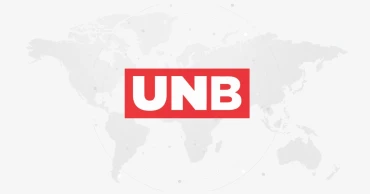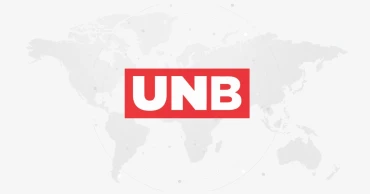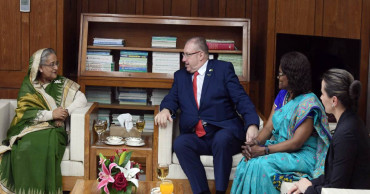poverty reduction
Colombia seeks Yunus' advice on poverty reduction, 'total peace'
Senior Colombian ministers have sought Nobel laureate Professor Muhammad Yunus' advice on what the new three-month-old government of the country can do to take forward its vision of poverty reduction and "total peace."
Yunus is now in Colombia’s Bogota at the invitation of the World Business Forum to address a Latin American conference of business executives.
Since the recently elected President Gustavo is currently at the 27th Conference of the Parties to the UN Framework Convention on Climate Change (COP27), he instructed selected senior ministers to have an intensive consultation meeting with Yunus under the leadership of the minister in charge of the president's office.
Read: Bangladesh seeks OIC’s help to continue Rohingya genocide case
Yunus has been invited to Colombia by successive governments over the last two decades, and there are many programmes inspired by his work already running in the country, including microcredit programmes, social business programmes and university-initiated academic programmes.
During his visit, University Externado de Colombia, a leading university in the country, organised a large public event and invited Yunus to address it. The university has a joint programme with Yunus Centre and set up a Yunus Social Business Centre three years ago.
Yunus programmes in Colombia were presented by Yunus Centre on the work with universities, and Yunus Environment Hub about the projects for the environment and circularity in the Amazon region of the country as well as in other parts.
Read: Dhaka seeks proactive role from Thailand, ASEAN to repatriate Rohingya
This was followed by Yunus presenting his vision of a three-zero world and how that can be attained by building social business and with the involvement of the young people creating three-zero clubs.
The ministers appreciated Yunus's vision, as well as his work on the ground and his presentation, which was followed by a long discussion with them on aspects of microcredit, social business, globalisation, the role of youth, climate change, the environment and deforestation and the culture of peace.
3 years ago
UNDP to work with BRAC for accelerating pace of poverty reduction
The United Nations Development Programme (UNDP) and BRAC have partnered and signed a Memorandum of Understanding (MoU) to enhance the effectiveness of poverty eradication and make these efforts more impactful to ensure inclusive growth for Bangladesh.Sudipto Mukerjee, Resident Representative, UNDP Bangladesh, and Asif Saleh, Executive Director, BRAC, signed the MoU on Sunday on behalf of their respective organizations at UNDP office in the city.Under this partnership, both organizations will work together to enhance the effectiveness of the poverty eradication effort for fostering inclusive growth in Bangladesh.Evidence-based policies and programmes will be designed, and a platform will be created to further strengthen the social protection systems in Bangladesh to make sure no one is left behind, according to UNDP.
Also read: UNDP, BWJA seal deal to address, redress violence against women Signing the ceremony, Sudipto Mukerjee said the partnership will assist the government of Bangladesh to effectively identify and transfer social protection benefits to people living in extreme poverty."It will also pilot and develop holistic livelihood programmes collaboratively with different ministries of Bangladesh to ensure access to social safety net programmes and help the government in attaining the Sustainable Development Goals by 2030," he said. “A timely and much-required partnership to assist the Government of Bangladesh in bridging the gaps to achieve poverty eradication and sustainable livelihoods for people living in extreme poverty by 2030”, said Asif Saleh.
Also read: Norway, UNDP continue to work together for tolerant, inclusive BangladeshHe further emphasized that this partnership will help strengthen ongoing efforts and design new joint initiatives for social protection and resilience-building as we recover and try to build back better from COVID related shocks. BRAC and UNDP have a long history of successful partnerships at both the national and global levels in poverty eradication and human development and are committed to supporting the Bangladesh government in its effort to ensure inclusive growth.
4 years ago
World Bank praises Bangladesh for anti-poverty social schemes
Social protection programmes remain central to Bangladesh’s sustainable development policy and are progressively benefitting the poorer households across the country.
This affirmation of poverty alleviation has come from none other than the world's top lender, the World Bank.
However, more efforts are required for further reduction of poverty in Bangladesh, according to the World Bank.
Reallocating existing transfers to the poorest in the country can help bring down poverty further -- from 36% to 12%, the global lender said in its report unveiled on Thursday.
Read:Bangladesh receives $590 million World Bank financing to tackle Rohingya situation
The report titled ‘Bangladesh Social Protection Public Expenditure Review’ reflects on Bangladesh’s continued investment towards social protection and how it can improve on its existing framework, including planning, designing, programming, and delivery of the various social protection programmes and projects.
The report finds that the social protection programmes are mostly focused in rural areas. But, with almost one in five of the urban population living in poverty, and half of the households at the risk of falling into poverty, there is a need for rebalancing geographic allocations, it suggests.
About 11% of people in urban areas are covered by social protection whereas 19% of the urban population is poor. On the contrary, the coverage in rural areas is higher than the poverty rate, with programmes reaching 36% of people, while 26% live in poverty.
Using a social registry, such as the National Household Database can improve targeting of both programmes and households at a reduced cost.
“Over the last decades, Bangladesh has expanded its coverage of social protection programmes that now reach three in every 10 households in the country,” said World Bank Operations Manager for Bangladesh and Bhutan, Dandan Chen.
Read: World Bank lifts global growth outlook to 5.6% on US, China rebounds
“The Covid-19 pandemic has accentuated the need for a more robust, efficient, and adaptive social protection system. Going forward, well-targeted and less fragmented social protection programmes that consider the demographic change, unplanned urbanization, labor market vulnerability, and frequent shocks will help the country continue with its success of poverty reduction.”
In FY 20, Bangladesh spent about 2.6% of GDP in social protection, which is in line with countries with similar income levels. However, some risk groups remain underserved, in particular there are gaps in programing for early years and for the economic inclusion of poor and vulnerable youth and adults.
For example, in every eight poor people, one is a child. Yet, the poor young children receive only 1.6% of social protection expenditures.
Spending will be more effective if the allocations are aligned with the share of the poor in different categories, and with the different functions played by programmes, according to the World Bank.
“Investing in early childhood helps a child grow healthier and be more productive in adult life and thus break the cycle of poverty across generations,” said World Bank Lead Economist and a co-author of the report, Aline Coudouel.
Read:Bangladesh inks over $1 b deal with World Bank for responding to COVID-19 pandemic
“The country has taken innovative programmes, reflecting the life cycle approach. As patterns of risk change in different phases of life, the life cycle approach needs to encompass support from pregnant mothers to old age, persons with disabilities, as well as from households facing shocks to those in chronic poverty."
To boost the quality and efficiency of service delivery, the government-to-person (G2P) and mobile financial services should be scaled up, suggests the report.
It takes about two months to transfer the funds from treasury to the beneficiary. The G2P scheme can cut processing time to 10 days.
This also needs to be paired with increased allocations for staffing, capacity-building training, including digital literacy, and improved equipment, which will facilitate enhanced implementation of programmes at the local level.
4 years ago
Experts for increased rural digital connectivity for poverty reduction in APAC
Cross-sector collaboration is needed to lower the costs of rural area connectivity and improve digital literacy to close the digital divide and drive economic recovery during the pandemic, experts said at a webinar recently.
The Financial Times and Huawei organised the event "Strategies for Addressing the Asia-Pacific Digital Divide – Increasing Connectivity to Drive Economic Recovery."
Read Huawei to invest $150 million in talent development
The Asia Pacific is speeding up for digital transformation and underpinned by dynamic markets and a young population.
The significant rift of digital access yet hinders wider shares of digital benefits, which in turn leads to slower recovery from the pandemic. ICT leverages fundamental ways to drive economic rebound.
"This starts with fair access to digital services specifically on connecting the unconnected," said Michael Macdonald, the chief digital officer of Huawei Asia Pacific.
Read Mobile World Congress 2021: Huawei wins 5 awards
The ICT talent shortage is one of the key fields revealing the digital divide.
Poon King Wang, director of the Lee Kuan Yew Centre for Innovative Cities, Singapore University of Technology and Design, called for long-term strategies and sustained support to upskill people across generations and ensure the wellbeing of workers in digital transformation.
In 2017, Huawei, the ICT Division of Bangladesh, and Robi Axiata jointly launched the Digital Training Bus project to bring digital skills to women in the heart of rural Bangladesh. More than 60,000 women have received training till now, and 160,000 more will benefit from it by 2023.
Read Huawei launches new 5G products
To lessen the imminent labour deficit in APAC, 400,000 more people are expected to be digitally upskilled in the next five years through Huawei educational flagship programs such as Seeds for the Future and ASEAN Academy, according to Michael MacDonald.
4 years ago
Xi Jinping -- Leading CPC to strive for a better world
"What we Chinese Communists are doing is to better the lives of the Chinese people, rejuvenate the Chinese nation, and promote peace and development for humanity."
Addressing over 600 representatives of political parties from over 120 countries at a high-level dialogue in 2017, Xi Jinping, general secretary of the Communist Party of China (CPC) Central Committee and president of China, laid out the historic mission of the world's largest political party.
Read:Interview: CPC offers significant governance experience, says PCI leader
Committed to the party's original aspiration, Xi is leading the CPC not only to build China into a modern socialist country but to create a better shared future for the world.
DEVELOPMENT FOR ALL
A day before the official centenary of the CPC on Thursday, China, after a 70-year fight, was officially declared malaria-free by the World Health Organization, which marks the latest of the numerous achievements China has made under the CPC's leadership.
In February, Xi announced that China, with a population larger than 1.4 billion, had secured a complete victory against poverty, which was widely acclaimed as a miracle in the human history of poverty reduction.
While striving to improve the wellbeing of its own people, the CPC has also been committed to promoting the world's common development. In his 2017 New Year speech, Xi said the Chinese people "hope for a better life for people in other countries as well as for themselves." And he has been leading China to make that hope come true.
Whether in the fight against malaria or in poverty alleviation, China has over the past decades extended a helping hand to others, especially developing countries.
Back in 2000, Xi, then governor of southeastern China's Fujian Province, helped launch a pilot Juncao project to help improve the livelihood of the Papua New Guinean people.
Juncao, famed as "magic grass" and discovered by Chinese scientists, is an economical and environmentally friendly substitute for timber, which can be used as a substrate for growing mushrooms.
Eighteen years later, during Xi's state visit to the Oceanian country, the two countries signed another aid project using the grass technology. By 2023, the aid program is expected to lift 30,000 local people out of poverty.
Today, the Juncao project has taken root in over 100 countries, helping combat poverty in developing countries in Africa, Asia and the South Pacific region.
Meanwhile, from the decades-old Canton Fair to the 3-year-old China International Import Expo and to the newly launched China International Consumer Products Expo, high-end international expos have repeatedly demonstrated China's commitment to wider opening-up and mutual benefits.
Read: China sees remarkable achievements under CPC leadership, says Pakistani PM
4 years ago
Nations must work together to reverse setbacks to poverty reduction: WB
Reversing setbacks to poverty reduction requires nations to work together for a resilient recovery, according to a new World Bank report.
5 years ago
Mobilising resources critical to end poverty: Bangladesh
Permanent Representative of Bangladesh to the United Nations Ambassador Rabab Fatima has said eradicating poverty in all its forms everywhere is an overarching goal for Agenda-2030.
5 years ago
Bangladesh a global model for poverty reduction: WB
Reiterating its commitment to help the country sustain its high economic growth, World Bank Vice President for South Asia Hartwig Schafer on Wednesday termed Bangladesh a ‘model for poverty reduction globally’.
6 years ago


.jpg)
.jpg)


.jpg)



